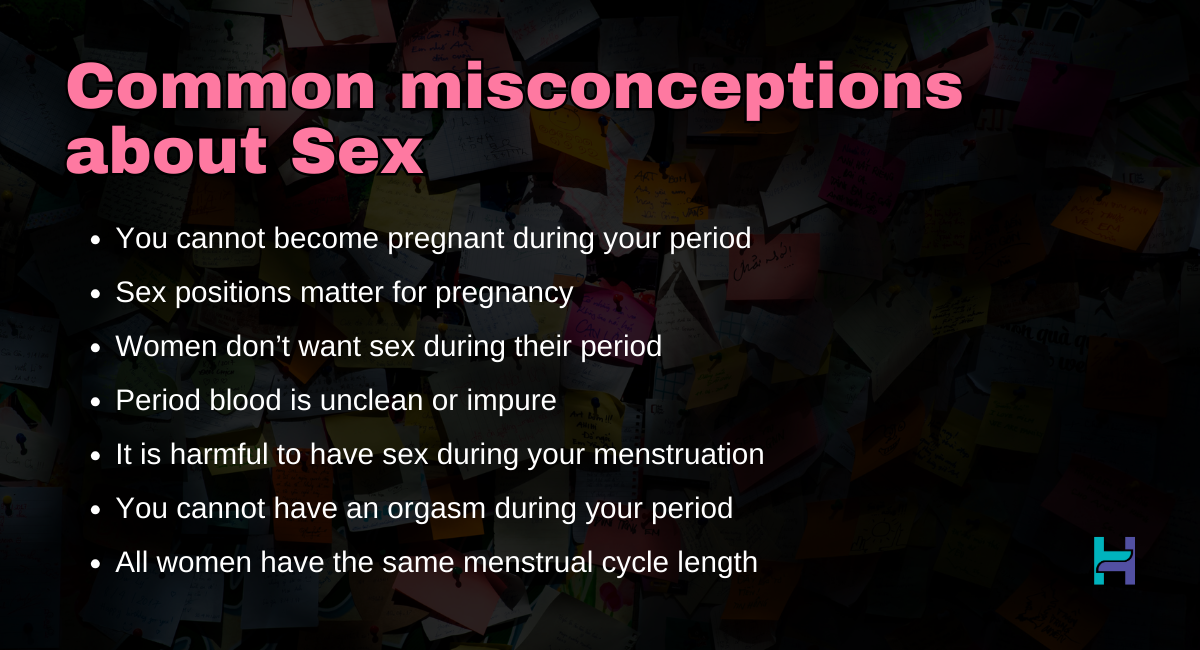Menstruation and sex have a direct relation if we’re talking about unprotected sex (intercourse). But if someone’s using proper protection, the chances of irregular periods are unlikely.
Although this question is very common among women scientifically speaking, having protected sex cannot influence your hormones to have irregular periods (menstrual cycle) unless you’re pregnant.
However, a lot of other factors can influence your periodic cycle. It’s crucial to understand those factors before concluding.
We’ll explore those factors in this article along with debunking some common myths about sex and periods.
But, let us answer the question.
Can Having Sex Delay Your Period?
No, there is very little scientific evidence that having intercourse might cause a delay period. Stress relief and hormonal changes linked with sexual activity might modify the time of ovulation, which can then influence the timing of your menstrual cycle.
Moreover, the physical act of intercourse can occasionally produce small stress on the cervix, which can result in temporary abnormalities in the menstrual cycle. However, further study is required to properly comprehend the link between sex and menstrual cycle time.
Note: Please visit your nearest gynecologist for a personalized recommendation.
Debunking common misconceptions about Sex and the Menstrual cycle
Over time, due to poor knowledge and taboo perception, false theories have been spread about sex and the menstrual cycle. Some of them are discussed below:
-
You cannot become pregnant during your period: While it is less likely, you can still become pregnant if you engage in unprotected intercourse during your period. Sperm may live in the body for many days, so if you ovulate soon after your period stops, there is a possibility of pregnancy.
-
Sex positions matter for pregnancy: Sex positions have little effect on the chance of becoming pregnant. The presence of viable sperm that can reach the egg is critical.
-
Women don’t want sex during their period: While some women report a drop in libido during menstruation, others may experience an increase in sexual desire as a result of hormonal changes. It depends on the person.
-
Period blood is unclean or impure: Menstrual blood is just like any other blood; it is neither dirty nor impure. It is a normal biological activity that aids in the shedding of the uterine lining.
-
It is harmful to have sex during your menstruation: Having sex while menstruating is safe as long as both participants are comfortable and consenting. It can also relieve menstruation cramps for some ladies.
-
You cannot have an orgasm during your period: While some women may have difficulty achieving orgasm during their period owing to pain or other circumstances, it is still possible.
-
All women have the same menstrual cycle length: The length of the menstrual cycle varies from woman to woman, and even month to month within the same woman. A "normal" menstrual cycle can last from 21 to 35 days.
- Periods synchronize when women live together: While some studies imply that women who live together have synchronized menstrual periods, the data is inconclusive, and many professionals dismiss it as a myth.

10 Factors that can affect menstrual cycles
Irregular periods are frequent. However, frequent or significant fluctuations in a person's menstrual cycle may suggest an underlying medical issue. Fibroids, stress, and other factors can all contribute to irregular periods.
-
Pregnancy: It prevents women from having periods. A missing period or spotting instead of a menstruation might be the first indication.
-
Hormonal birth control: Birth control suppresses ovulation. This indicates that a person does not have genuine menstruation. However, persons who take hormonal birth control pills, patches, implants, and intrauterine devices (IUDs) may still have vaginal bleeding.
-
Breastfeeding: Prolactin is a hormone that regulates breastfeeding production. It can also inhibit ovulation, particularly in women who exclusively and regularly breastfeed their babies during the first several months of their lives. This indicates that a person may not experience periods throughout this time.
-
Perimenopause: Perimenopause is the initial stage of menopause, beginning 4-8 years before menopause, often in the 40s.
During perimenopause, the menstrual period can lengthen or shorten at various stages. Periods become less frequent over time, and they end entirely when menopause occurs.
-
Stress: According to the research, when a person is worried, their body produces stress chemicals like adrenaline and cortisol. These may interfere with the sex hormones that control menstruation.
-
Polycystic ovary syndrome: Irregular periods are the most prevalent symptom of polycystic ovarian syndrome (PCOS), which occurs when cysts develop in the ovaries. People with this disorder frequently have elevated amounts of androgens, which are male sex hormones. This can inhibit ovulation and cause irregular cycles.
-
Hormone glands : Hypothyroidism can cause a woman's thyroid gland to fail to generate sufficient hormones. This can cause longer, heavier periods. Other symptoms include fatigue, susceptibility to colds, and weight gain.
-
Uterine fibroids: Fibroids can be the cause of painful and heavy periods, which can lead to anemia.
-
Underweight: Excessive or quick weight loss might cause irregular periods. This occurs when some regions of the brain stop producing hormones that influence the menstrual cycle. It is called hypothalamic amenorrhoea, and it results in an estrogen insufficiency.
- Medicine: Certain drugs can influence the menstrual cycle, such as medicines for blood thinning, such as aspirin, NSAIDs like ibuprofen (Advil, Motrin), and thyroid medicines, Antidepressants and epilepsy medications, Chemotherapy medicines.
What is the impact of sex on menstrual cycles?
Sex can have a variety of effects on menstrual periods, both physiological and hormonal. Here are a few ways that sex might affect menstruation:
Menstrual pain relief: Some women report that orgasms help ease menstrual cramps. This is because orgasms can stimulate the production of endorphins, which are natural painkillers.
Shortened menstrual periods: According to certain research, sexual activity may cause shorter menstrual periods. The specific cause isn’t known but it might be due to hormonal changes or increased blood flow to the pelvis.
Menstrual flow changes: Sex or orgasms can occasionally induce variations in menstrual flow. Some women may experience more bleeding, while others may have milder periods.
Hormonal changes: Sex can temporarily alter hormone levels, especially those related to the menstrual cycle. For example, the hormone prolactin, which is produced after an orgasm, might briefly decrease ovulation.
Menstrual cycle irregularities: While certain alterations in the menstrual cycle are natural, frequent or major changes may indicate an underlying problem. If you observe any persistent anomalies, you should visit a healthcare specialist.
Mood swings: Sex may improve one's mood and reduce stress, which might have an indirect impact on menstrual periods. Reduced stress levels can sometimes contribute to more consistent menstrual periods.
These can be the impact of sex during periods but please note, these results vary from person to person. Hence, it’s best to see your specialist if you notice severe symptoms.
Also read: Does your menstruation impact thyroid test?
Final say
There is very little evidence and scientific research available that having sex can potentially delay your period, the relationship between sexual activity and menstrual cycle timing isn’t certain and research is still undergoing.
Few factors such as stress relief, hormonal changes, and cervical trauma may play a role in temporarily altering the menstrual cycle.
Overall, if you have concerns about your menstrual cycle, it's best to consult with a healthcare professional for personalized advice and guidance.



